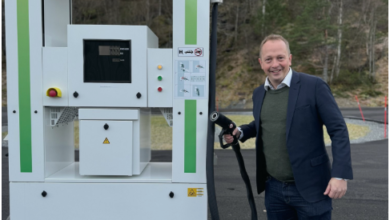ULEMCo and Skanska to bring hydrogen dual-fuel to the construction sector
Testing to start on World’s first hydrogen dual-fuel piling rig.

ULEMCo, Cementation Skanska and Building Research Establishment (BRE), are working together on a project that will produce and evaluate dual-fuel hydrogen and diesel piling machine – a world first.
It’s being backed by Government funding from Phase 1 of the Red Diesel Replacement programme, part of the Net Zero Innovation Portfolio (NZIP) under the Department for Business, Energy & Industrial Strategy (BEIS).
Named ZECHER for ‘Zero Carbon Hydrogen Construction Equipment for Real-world use’, the project will provide a proof of concept for converting on-site construction equipment. It will deliver the physical conversion of the rig and explore the viability of hydrogen fuel for construction site decarbonisation.
The trial is being carried out on a Soilmec SR30 rotary and CFA piling rig at Cementation Skanska’s state of the art plant and fabrication facility at Bentley Works, South Yorkshire. With its Cummins QSB6.7 engine, the rig is a medium-sized rig used in construction. Machines like these can typically use 100 litres of diesel per day of operation, leading to 262 kg CO2 in emissions. Decarbonising such machines will support the construction sector to achieve net-zero carbon by 2050.
While transport applications of hydrogen fuel are becoming better known, the use of hydrogen to reduce or eliminate emissions in the construction sector is less developed. The test will be undertaken on a piling rig, but ZECHER will use these findings to explore the opportunities for using hydrogen to reduce carbon and significantly improve air quality for a range of heavy-duty, non-road machinery typically used in the early stages of large infrastructure construction projects.
The project will examine the range of equipment used at a construction site, create detailed energy use and duty cycle data, and investigate the requirements and options for addressing the challenges of providing hydrogen at scale across the country. Given the high volumes involved, conversion to hydrogen dual-fuel will enable costs for green hydrogen to fall below that of white diesel if the barriers of meeting the on-machine storage challenge of energy density are addressed.
BRE’s role in the project is to look across the sector and to help accelerate the transition to clean fuels. Hydrogen looks to be one of the only currently viable routes to doing this in the available timescale.
Amanda Lyne, MD of ULEMCo, said, “ZECHER plans to show that conversion to dual-fuel will save up to 50% CO2 in this duty cycle, and we expect that it will provide additional emissions benefits such as reduction in NOx and particulates.”
Terry Muckian, Managing Director, Cementation Skanska, said, “We have already done this with HVO (hydro-treated vegetable oil), with all our plant fleet including piling rigs running on this fuel since the beginning of 2022.”
“The UK construction sector uses around 1 billion litres of fuel annually, generating about 2.7m tonnes of CO2, and therefore finding ways to decarbonise the sector is critical to delivering the UK’s targets for net zero”, said Ranjit Bassi of BRE.”
